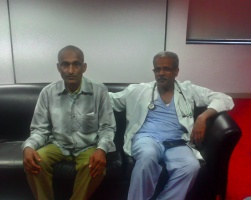Apr 25, 2022
Timely Emergency Support at Paras HMRI Helps Resuscitate Patient after Sudden Cardiac Arrest

Patient, diagnosed with impending heart attack, suffered sudden cardiac arrest
Timely and prompt emergency response can save lives of many cardiac arrest patients in India
In an encouraging example of how timely and prompt emergency medical response can save lives of serious cardiac arrest patients, doctors at Paras HMRI Hospital, Patna successfully revived and saved a 52-year-old patient who was rushed to the hospital with severe chest pain and suffered a cardiac arrest.
Not only was Ramakant Panda (name changed to protect identity) was successfully revived after his heart had stopped beating, a rescue angioplasty was also performed on him within 10 minutes, ensuring his complete recovery.
With heart diseases being one of the major causes of death in our country, most people who experience unanticipated pain in the chest often fail to recognize it as a heart attack episode or fail to reach hospitals on time. This is the reason for high numbers of heart attack related deaths in our country.

Jpeg
Panda, who is a home guard by profession, was lucky to not only have reached the hospital within the Golden Hour, but also having been in the hands of highly efficient medical practitioners well versed with the importance of prompt emergency response.
Panda reported to the emergency department of the hospital with severe sensation of chest pain. Dr Pramod Kumar, Director, Cardiology made a diagnosis of an impending heart attack and even as the patient was being rushed to the coronary care unit (CCU) he suffered a sudden cardiac arrest. Immediately, the team of doctors led by Dr Pramod performed life-saving emergency actions on him to revive his heart and bring him back to life. He was administered DC Shock and Cardio Pulmonary Resuscitation (CPR) to resuscitate his dying heart. Once he was brought back to life and his heart rhythm stabilized, angioplasty was performed on him to remove the blockage in his artery.
“Cardiac arrest deaths can be prevented up to a great extent with correct intervention during the ‘Golden Hour’. It is important to understand that each and every second matters in such emergencies as chance of survival reduces by up to 10% with every passing minute. In this case, the patient was middle-aged and the whole issue was highly risky and time-sensitive. His pain worsened on arriving at the CCU. I sensed the crisis and immediately started the recovery mechanism with DC shocks and cardiopulmonary resuscitation (CPR) techniques,” says Dr. Pramod Kumar
Ramakant was then moved to the catheterization lab of the hospital in order to visualize the heart condition in a better way using specialized equipment for diagnostic imaging.
“The condition of the patient was worsening at a fast pace. Soon after he was shifted to the cath lab, he started having recurrent ventricular fibrillation. VF generally begins as a very fast excitation of the ventricles of the heart. Very soon, it limits the heart’s ability to function as a pump and can act as the primary cause of sudden cardiac deaths. We realized that it’s a touch-and-go situation and there was just no more time to waste,” said Dr. Pramod Kumar
Since Panda had no relatives present and was not in a position to take a decision, Dr Pramod’s team immediately got in touch with his superiors and the hospital management, who gave them the permission to proceed with primary angioplasty (without considering lack of financial viability), which helped the patient overcome blockages in the heart.
“Angioplasty is an endovascular procedure used by doctors to widen obstructed arteries using a thin tube. Within 10 minutes, we performed an angioplasty which helped in reducing chest pain caused by minimal blood flow into the heart. Thankfully, he recovered completely after the procedure without any further complications,” adds Dr. Pramod Kumar
Health experts define Sudden Cardiac Arrests (SCA) as episodes which may cause death of an individual within sixty minutes of symptom. Statistics from WHO reveal that mortality due to cardiac issues has recently overtaken deaths caused by all forms of cancers put together, and in India, as many as 4,280 out of every 1 lakh people die every year from SCAs.
Medical emergency response mechanism is still at a nascent stage in India. Doctors at Paras HMRI Hospital, Patna are continuously striving to sensitize people about the timely detection of symptoms and fast action required to fight the growing epidemic of cardiac arrests in India and achieve the goal of treatment within the golden hour.
Since its inception, the hospital has been aligned to the vision of accessible and affordable healthcare for all citizens and specializes in emergency healthcare delivery to diagnose and stabilize critical patients within short spans of time using high standards of patient care.


